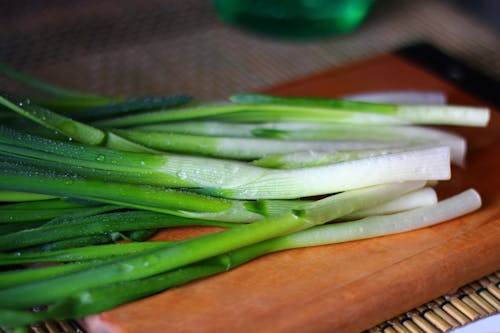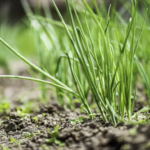
Green onions are a variety of onion that are either plucked before the bulb forms or naturally lack a large bulb. They are also sometimes referred to as spring onions or scallions. With a softer bite, they offer a lot of the flavour of fully grown bulb onions. They also have edible green leaves that provide a different kind of nutrients than bulb onions.
Green onions nutritional facts
Calories: 4.8
Carbohydrates: 1.1g
Fat: 0g
Fiber: 0.4g
Protein: 0.3g
Sodium: 2.4mg
Sugar: 0.4g
Carbohydrates
Just over one gramme of carbohydrates can be found in a single raw green onion, of which around half are found in fibre and the other half in sugar. Glycemic index is not used to measure green onions, unlike most other non-starchy vegetables. They are presumed to have a low GI because their low carbohydrate content prevents them from being tested for the glycemic index. Eating them is thought to have a very low glycemic load, which means that it does not considerably increase blood sugar levels based on the quantity taken.
Protein
Green onion have relatively little protein as well.
Fat
Like other vegetables, green onion are almost entirely fat-free.
Minerals and Vitamins
In terms of nutrition, green onion combine the advantages of leafy greens like chard or spinach with onions. One medium green onion supplies 34% of the recommended daily intake of vitamin K for women, making them a great source of the vitamin. They are also an excellent source of folate, vitamin C, and A.
Calories
Green onions are a great garnish for salads, soups, and dips because they are a low-calorie snack, containing only 32 calories per chopped cup. They can also be used as a topping or added to salsas to improve the color and flavor. Green onion is a nutritious and low-calorie meal option because of their high nutrient content.
Health benefits of Green onions
The common onion has remarkable anti-disease and pro-health properties. Try utilising larger amounts of green onions instead than just as a garnish to optimise their nutritional value.
Promotes Healthy Bones
You may get your recommended daily intake of vitamin K—which is essential for healthy bones and blood clotting—by eating three medium-sized green onions. Research has explicitly linked onions to a lower incidence of osteoporosis.
May Reduce Cancer Risk
Green onions, like garlic, leeks, and chives, belong to the Allium family and contain chemicals that may offer some cancer-prevention power. Studies have linked consuming these vegetables to a lower incidence of endometrial, lung, colorectal, myeloma, and prostate cancers.
Decreases Obesity and Associated Conditions
Scholars are delving into the myriad of antioxidants and bioactive substances found in onions, uncovering their potential efficaciousness in combating obesity and associated ailments like diabetes and hypertension. One study suggests that these benefits may be due to the heart-healthy Mediterranean diet, which emphasizes onions and similar vegetables.
Increases Immunity
Vitamin A, found in green onions, is considered one of the best foods for boosting immunity. One cup of green onions contains a substantial amount of this crucial component. They also include additional minerals like magnesium and vitamin C that strengthen immunity. Onions also include phytonutrients, which are antioxidants that help shield your cells from harm.
May Reduce Blood Pressure
Research indicates that flavonoids, present in green onions, may aid in lowering “bad” cholesterol (LDL) and increasing “good” cholesterol (HDL). For optimal benefits, consume onions fresh or, if cooked, include the juice, as many studies examined raw onions.
Allergies
Although rare, medical journals have reported a few examples. See your physician for a diagnosis and treatment recommendations if you think you may have an allergy to green onion or any other food. In addition, seasonal mugwort pollen allergies can result in oral allergy syndrome, which manifests as symptoms like mouth swelling and irritation around raw fruits and vegetables. Other veggies like cabbage, parsley, garlic, and peppers might also cause an adverse response.
Adverse Effects
Taking vitamin K consistently is necessary if you take the blood thinner Coumadin (warfarin). This can entail keeping an eye on how much green onion and other leafy greens you eat. For advice, talk to your physician or a qualified nutritionist about your nutritional needs.
Varieties
Onions come in a wide range of varieties. Depending on when you harvest them, you can utilize any of them as green onions.
Best Times to Use
Green onions have little root shoots and a strong white foundation with brilliant green tops. They are accessible all year round. You can eat the whole green onion, though you might want to cut off the little roots. Compared to bigger bulb onions, the flavor of a green onion’s bulb is milder. You can even grow green onions again by submerging the base in a small container of water.
Food Safety and Storage
Discard any broken leaves and remove any packaging, such as rubber bands. Place green onions in a plastic bag and keep them in the refrigerator’s vegetable crisper drawer.
If kept for longer than five days, green onions may wilt or lose their crispness within two to three days, depending on their initial freshness at purchase. Keep them apart from items like corn and mushrooms that absorb the smell of onions.
Tips for Preparation
While people typically eat green onion fresh, you can also slice, roast, grill, or sauté them. Use them to flavor chicken salad or tuna salad, or as a garnish for soups, salads, or dips. Put green onions, garlic, ginger, and olive oil in a food processor to make a pesto-like sauce or spread that goes well with meats or veggies.
To sum up, green onions are not only tasty and adaptable, but they also have a lot of nutrients. They are high in vital vitamins like vitamin K, vitamin A, vitamin C, and folate but low in calories and fat. A beneficial complement to a balanced diet, with potential health advantages ranging from encouraging bone health to perhaps lowering cancer risk and increasing immunity. Eaten raw as a garnish or cooked into many different dishes, green onions are a versatile vegetable with health benefits that are well worth investigating.



Pingback: Clove of Garlic?
Pingback: Canning Beets: 8 Easy Steps